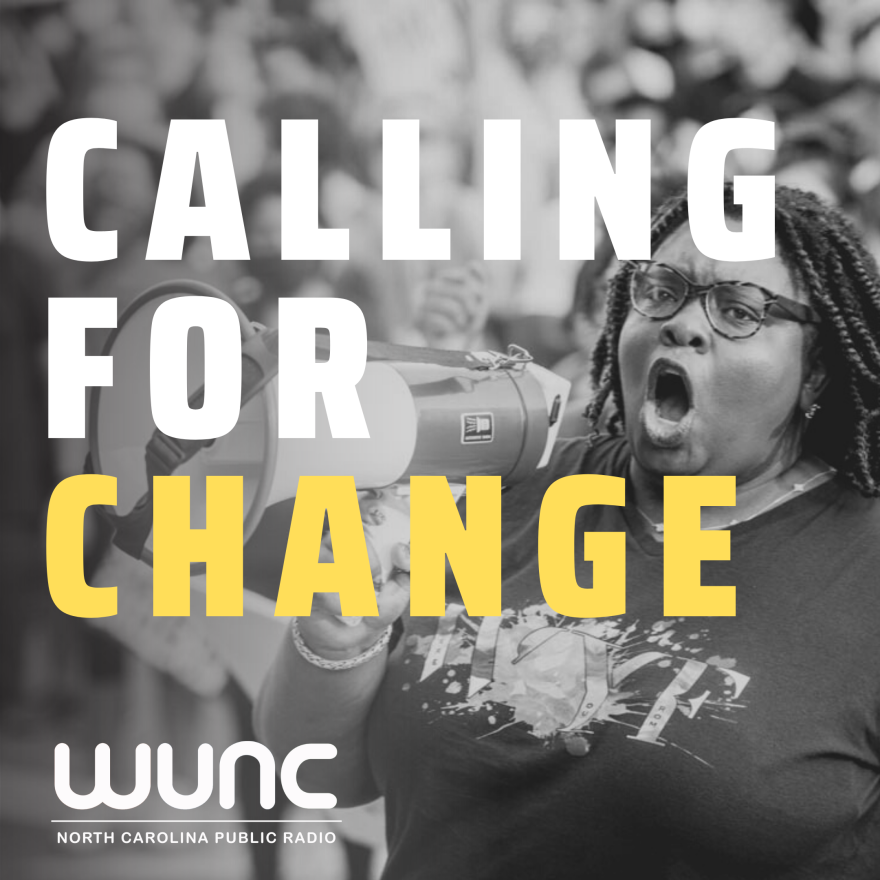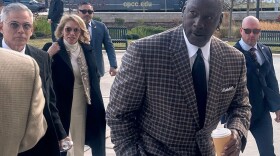Greg Drumwright has spent most of his life in North Carolina’s Triad region. He was raised in Burlington, attended college at North Carolina A&T and then Wake Forest, and for the past 17 years has led The Citadel Church in Greensboro.Rev. Drumwright has a busy life. When he’s not preaching or serving on the NC Courts Commission – a position he was appointed to by Gov. Roy Cooper – he’s been using his voice to advocate for change. Drumwright has been at the forefront of protests in Graham that call for a Confederate monument to be removed, and he’s also visited NASCAR tracks across the south and met with leaders of the sport.
In this installment of WUNC’s “Calling for Change” series, Drumwright talks about growing up as a fair-skinned Black man in North Carolina, his work with younger activists, and his hope for the future.
Interview Highlights

On his childhood and praying that he could be white:
When I was introduced to my peers as the ‘little Black boy,’ I knew then that there was something different about me that I couldn't yet explain, but it wasn't working to my advantage.
It was something about where I was situated in school, and my (white) babysitter caretaker at that time, that made me walk home and say, ‘Lord, make me white.’ And I have this very, very, very vivid memory of saying that over and over and over and over until I got to my front door. I prayed that prayer.
In hindsight, what was my society teaching me about America? I could obviously discern that there was some form of ease of life that went along with (being white).
On visiting Talladega and seeing Confederate flags at NASCAR tracks after the sport had banned it:
We were stopped and told when we were pulling into Talladega to ‘Get out of Talladega.’ We were told that it wasn't safe for us. In 2020, it's not safe for a Black body to be somewhere? So, it was scary. And the folks that were with me, some of them were terrified. When we rolled into in Talladega, we saw Confederate flags for sale 20 feet from the raceway property.
The thing that I want NASCAR to understand and realize – while they do as much as they're doing to diversify their sport – is that, in Talladega, that Confederate flag flew above the stadium. They have to know that, if it's still in the air, it's still on the ground. And what some white folks are saying to us is that, ‘This is our corner. This belongs to us.’ Because it represents the dark past of segregation and slavery. Those Confederate monuments are to the ode and the praise of Confederate war generals that fought for slavery to stay intact.

On the protests in Graham:
These young people that I have been in the street with, I consider them prophets, not protesters. I consider them demonstrators of civil rights activism. Protest is, to me, such a simple and small talk. It's really not (crediting) what these young people have done to move the conversation about Black Lives mattering forward.
What's happening in Graham is unique because a part of the history that erected that Confederate monument is Wyatt Outlaw. Wyatt Outlaw was Alamance County's first-known Black elected official. And Wyatt Outlaw was hung where that Confederate monument was erected, right there in the center of the court square in Graham, North Carolina, in 1870.
An upstanding Black elected official was hung, lynched, murdered, and in his place, they erected a Confederate monument. The politics around that monument is deep. It is a more painful past, a more painful reminder, than just a General Lee statue in 'somewhere, North Carolina.'
On his hope for the future:
My hope is that Black folks will receive a cure to what I call ‘Black insanity.’ That every day when we walk out of our doors, that we wouldn't be reminded of our blackness because of white oppression.
My hope is that those words, ‘the land of the free,’ that we would truly, truly feel like we're living in a liberated America. Because right now, even in this post-slavery era, we're still in shackles. We're still in chains. Our bodies are still viewed as unequal.














